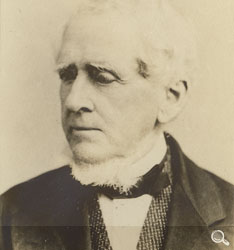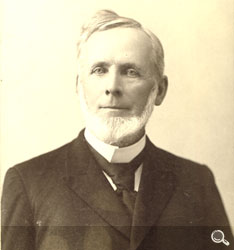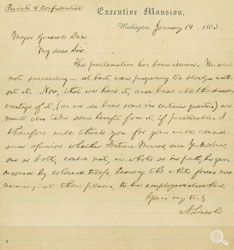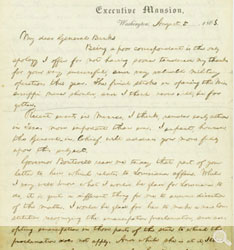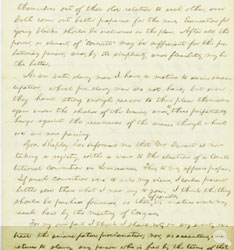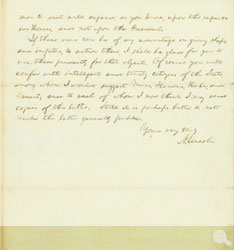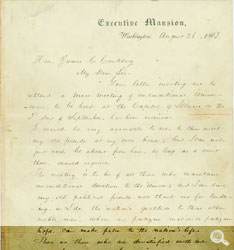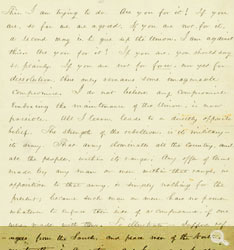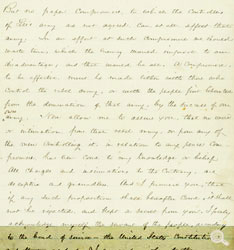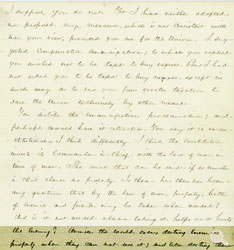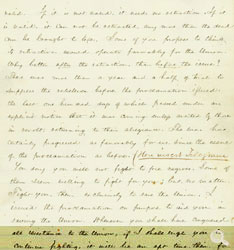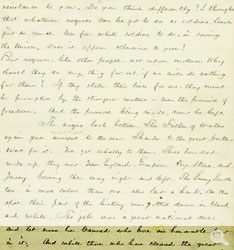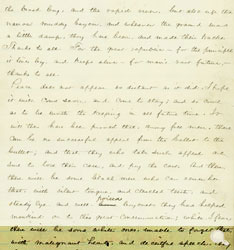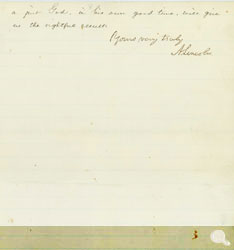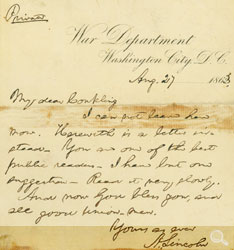

Defending Emancipation
Lincoln countered emancipation critics by stating, "The proclamation has been issued. We were not succeeding—at best, were progressing too slowly—without it." He argued the military necessity of enlisting black troops. In a letter to General John Dix, Lincoln advanced the use of black troops to garrison the Union forts and further the Union cause.
John Adams Dix (1798–1879) was a New York lawyer and politician before his appointment as a major general in the New York Militia. He served from May 1861 until April 1865 in various commands. Photograph courtesy of the Abraham Lincoln Presidential Library and Museum.
But he did not stop there. For example, Lincoln urged Louisiana to adopt “a new Constitution recognizing the emancipation proclamation” in all parts of the state. He realized emancipation fueled rising expectations for blacks and viewed education for young blacks as essential if "the two races could gradually live themselves out of their old relations to each other, and both come out better prepared for the new."
James Cook Conkling (1816–1899) shared Lincoln’s interest in law and Whig politics. An avowed antislavery man, Conkling was also one of Lincoln’s strongest allies in Springfield.Photograph courtesy of the Abraham Lincoln Presidential Library and Museum.
Nowhere did Lincoln mount a greater defense of his emancipation policy than in his hometown of Springfield, Illinois. James Conkling, a friend of Lincoln’s, read the president’s remarks to 75,000 Union supporters. Lincoln reminded his audience of the significant contributions of black soldiers: "And then, there will be some black men who can remember that, with silent tongue, and clenched teeth, and steady eye, and well-poised bayonet, they have helped mankind on to this great consummation; while, I fear there will be some white ones, unable to forget that, with malignant heart, and deceitful speech, they have strove to hinder it."
Abraham Lincoln to General John Dix, January 14, 1863
Abraham Lincoln to General John Dix, January 14, 1863. On loan from the Abraham Lincoln Presidential Library and Museum.
Dix agreed with Lincoln that 2,000 black troops could be effectively stationed at Yorktown, Virginia, to aid the Union cause. Because nearby Fortress Monroe held a strategic position along the Chesapeake Bay, Dix argued, "I think this post should be held by the best and most reliable troops the country can furnish…."
Download text transcript of document (.pdf)
Download image of document (.pdf)
Abraham Lincoln to General Nathaniel Banks, August 5, 1863
Lincoln’s logic of emancipation for Louisiana is clearly presented. "As an anti-slavery man I have a motive to desire emancipation, which pro-slavery men do not have; but even they have strong enough reason to thus place themselves again under the shield of the Union; and to thus perpetually hedge against the recurrence of the scenes through which we are now passing."
Download text transcript of document (.pdf)
Page 1: Abraham Lincoln to General Nathaniel Banks, August 5, 1863. On loan from the Abraham Lincoln Presidential Library and Museum.
Page 2: Abraham Lincoln to General Nathaniel Banks, August 5, 1863. On loan from the Abraham Lincoln Presidential Library and Museum.
Page 3: Abraham Lincoln to General Nathaniel Banks, August 5, 1863. On loan from the Abraham Lincoln Presidential Library and Museum.
Abraham Lincoln to James Conkling, August 26, 1863
This letter provides Lincoln’s strongest argument against his emancipation critics. "Why should they [blacks] do any thing for us, if we will do nothing for them? If they stake their lives for us, they must be prompted by the strongest motive—even the promise of freedom. And the promise being made, must be kept."
Download text transcript of document (.pdf)
Download image of document (.pdf)
Page 1: Abraham Lincoln to James Conkling, August 26, 1863. On loan from the Abraham Lincoln Presidential Library and Museum.
Page 2: Abraham Lincoln to James Conkling, August 26, 1863. On loan from the Abraham Lincoln Presidential Library and Museum.
Page 3: Abraham Lincoln to James Conkling, August 26, 1863. On loan from the Abraham Lincoln Presidential Library and Museum.
Page 4: Abraham Lincoln to James Conkling, August 26, 1863. On loan from the Abraham Lincoln Presidential Library and Museum.
Page 5: Abraham Lincoln to James Conkling, August 26, 1863. On loan from the Abraham Lincoln Presidential Library and Museum.
Page 6: Abraham Lincoln to James Conkling, August 26, 1863. On loan from the Abraham Lincoln Presidential Library and Museum.
Page 7: Abraham Lincoln to James Conkling, August 26, 1863. On loan from the Abraham Lincoln Presidential Library and Museum.
Page 8: Abraham Lincoln to James Conkling, August 26, 1863. On loan from the Abraham Lincoln Presidential Library and Museum.
Abraham Lincoln to James Conkling, August 27, 1863
Unable to attend the Grand Union Rally in Springfield, Lincoln sent his comments along with these instructions: "Read it very slowly.""
Download text transcript of document (.pdf)
